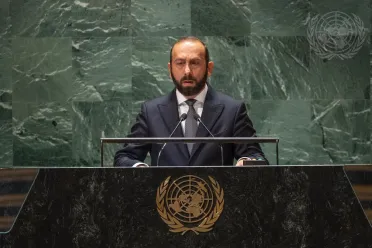Statement
Statement summary
ARARAT MIRZOYAN, Minister for Foreign Affairs of Armenia, said that eroding multilateralism — along with its foundations of international law, human rights and cooperative security — is not just a “theoretical influence, but the reality with which the Armenian people in the South Caucasus are coping for the last three years”. Azerbaijan’s repetitive aggression against Armenia’s sovereign territory and military attacks against the people of Nagorno-Karabakh significantly disrupt regional peace and stability, violate human rights and represent an existential threat for Armenians. While the Armenian Government has made significant, recorded efforts, he pointed out that “we do not have a partner for peace, but a country who openly declares ‘might has right’ and constantly uses force to disrupt the peace process”. Spotlighting the recent, large-scale offensive against the people of Nagorno-Karabakh — “it happened this week, and the timing was not accidental” — he said it demonstrates Azerbaijan’s open disregard for the international community gathered in New York.
That country’s message is clear, he stressed: “You all can talk about peace and we can go to war and you will not be able to change anything.” The offensive — cynically defined as a local counter-terrorist operation — claimed hundreds of lives, including those of women and children. Further, Azerbaijan’s actions over the last nine months demonstrate the pre-planned nature of this mass atrocity. On 12 December 2022, Azerbaijan blockaded the Lachin Corridor — the lifeline connecting Nagorno-Karabakh to Armenia and the world — in blatant violation of its obligations. The blockade was further consolidated by the installation of an illegal checkpoint on 23 April and the complete cessation of any movement through the corridor — even for humanitarian aid — since 15 June. Underscoring that the “chronology of truly devastating developments” proves that issues cannot be addressed merely with statements, he noted that, despite Armenia’s repeated warnings, “the United Nations failed to come to the rescue”.
However, he stated that the people of Nagorno-Karabakh still hope that prevention will “not remain a feature of language, but will become a line of action”. He therefore called for the immediate deployment of an inter-agency UN mission to Nagorno-Karabakh to monitor and assess the human-rights, humanitarian and security situations on the ground. Additionally, Azerbaijan must finally adhere to its legally binding obligations and ensure the freedom of movement of persons, vehicles and cargo in line with orders from the International Court of Justice. Among other measures, he also underlined the need for a sustainable, viable international mechanism to prevent the ethnic cleansing of the population of Nagorno-Karabakh and to ensure dialogue between its representatives and Baku. He added that Azerbaijan’s “hidden agenda” of forcefully imposing on Armenia an extraterritorial corridor — passing through its territory but out of its control — is unacceptable.
Full statement
Read the full statement, in PDF format.
Photo

Previous sessions
Access the statements from previous sessions.
